"The taste of stockfish is life... We can't cook without stockfish."
That's the verdict of women at the bustling Onyingbo market in Nigeria's commercial capital, Lagos, as they carefully choose pieces of the specially dried cod.
Heads stare up from market stalls while whole bodies hanging on metal hooks sway in the humid breeze. Bundles of the golden-coloured fish have been cut into different sizes and are sold by weight.
The smell of stockfish is pungent and clings to the back of your throat. No wonder; the fish has been hung up to dry for three months until it is as dry as a tree bark.
As the moisture drips out, the flavour of the fish deepens to create a rich, intense and complex taste.
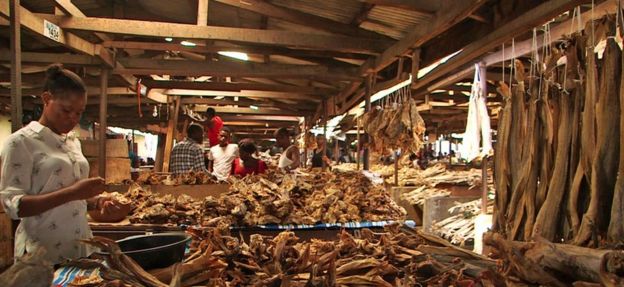
Image captionIn Nigerian markets the smell of stockfish permeats the air
It is perfect for a Nigerian palate, which favours big and bold flavours such as fermented locust beans and chilli pepper, says young chef Michael Elegbde.
Based in Lagos, Mr Elegbde is a rising star in Nigeria's culinary world - and his signature dishes revolve around stockfish. Growing up, he spent a lot of time helping his grandmother in the kitchen, and she loved stockfish as a key ingredient in traditional dishes.
"When we got home and we smelled the boiling stockfish we knew grandma is cooking, and now when I smell stockfish that nostalgia of my grandmother immediately kicks into my head," he recalls.

Image captionMichael Elegbde: "Stockfish is one of those ingredients that I believe has been a great part of our identity"
But it was only later in life - when he had followed in his grandmother's cooking footsteps - that he discovered the fish that he had grown up with actually came from almost half-way round the world, in the cold Arctic waters off the coast of Norway.
"As a kid I was never told that this stockfish was something from Norway. It was so common that I couldn't imagine it not being Nigerian."
Before Norway discovered oil and natural gas, its wealth was built on fisheries. Today fish exports are Norway's second highest earner, with stockfish going to Nigeria a hugely important element in this trade.
The archipelago of Lofoten - up in the far north of Norway - has the biggest concentration of stockfish producers in the world.

Image captionLofoten, in Norway's north, lies within the Arctic Circle
That is because every year between January and April, millions of cod migrate from the Barents Sea to breed in the fjords - and the climate is perfect for the natural drying process.
"You need both cold and dry weather, and you need sun. We have everything here. We are gifted from God," laughs Erling Falchs, whose family business Saga Fisk has been in the stockfish trade for six generations.
After gutting, cod is hung out on huge wooden A-frames, up to 10 metres high, and left to dry for three months in in the cold, crisp winter air. No salt, no additives - just in the same way that it has been dried since the time of the Vikings.
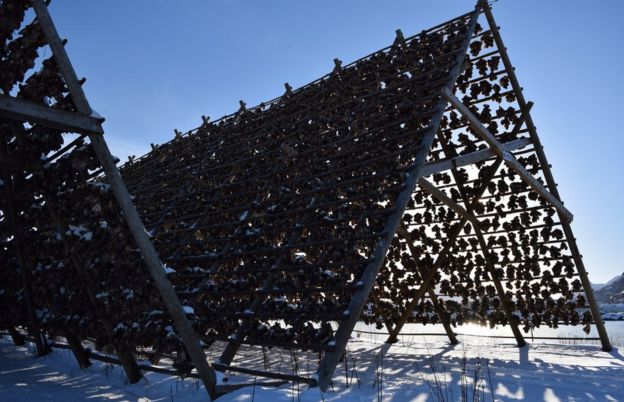
Image captionThe cod stay on these frames for three months in the freezing open air
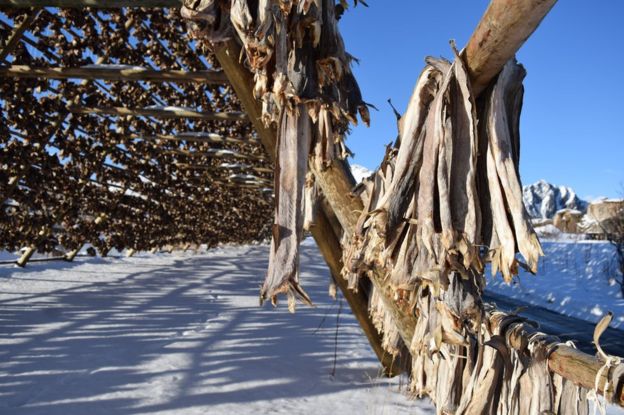
Image captionAfter months of preparation, the cod becomes hard and brittle
Although Nigeria has a long coastline teeming with other species of fish, people say the stockfish has a unique taste and so it is Norway's biggest export market for the fish.
"We sell about 200 to 250 containers of stockfish to Nigeria; that's about 4,000 tonnes," Mr Falchs says. "It's around 20 to 30 million dinners."
The past few years have been volatile, however. As the price of Nigeria's main source of income - oil - fell, the government restricted access to foreign exchange. Stockfish imports fell as a consequence.
But the market is bouncing back. Last year, exports to Nigeria have almost doubled to just over 7,000 tonnes.
That is still not as much as in 2014, when almost 9,000 tonnes of stockfish went to Nigeria.
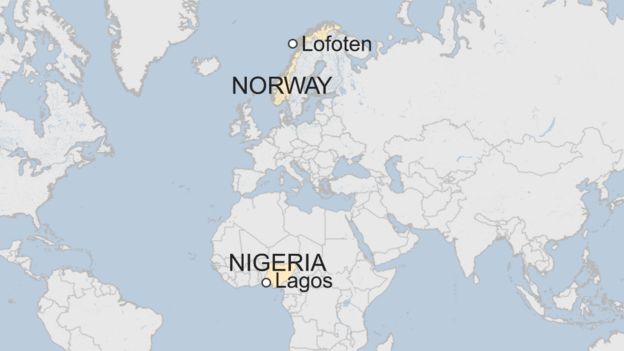
And it is not just Nigeria that Norway is targeting.
As Nigerians have settled in other West African countries - including Benin, Togo, Ghana and Cameroon - they have taken their beloved stockfish with them. And the taste for stockfish is slowly spreading.
So how did stockfish first arrive on Nigerian shores?
The process of drying it means that stockfish can last for years - and that made it perfect to be used as food for the West African people enslaved and sent on long sea voyages to the Americas, says Norwegian historian Frank Jensen.
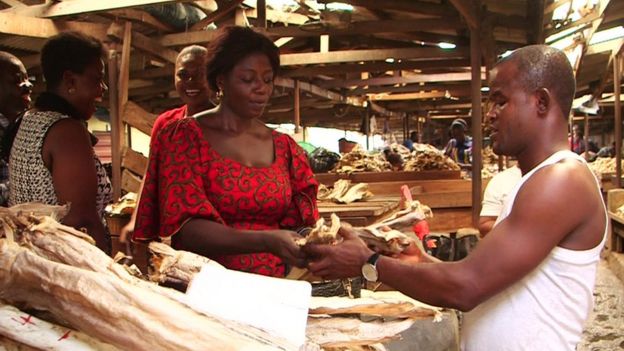
Image captionAt Onyingbo market, the finished product is traded in large quantities
But, as Mr Jensen points out, it was the Biafran civil war in Nigeria 50 years that really set the scene for stockfish to become a must-have ingredient in Nigerian cuisine.
In the course of three bloody years, more than a million people died - mostly from hunger. It was a humanitarian crisis on an unprecedented scale, and churches and relief agencies from all over the world joined together to fly in emergency supplies.
Norway's contribution was stockfish.
It doesn't need refrigeration, and it is full of protein and vitamins - perfect to combat kwashiorkor, the malnutrition that characterised the Biafran war.
"The single weapon against kwashiorkor was stockfish," says Edwin Mofefe, who was five years old when the war broke out. "It was our medicine."
For years Mr Mofefe couldn't eat stockfish because it brought back too many harrowing memories of the war.
Now, finally, he can not only stomach it, he has come to adore it for the depth of flavouring it brings to his favourite egusi or melon seed soup.
Fifty years on, stockfish has turned from an emergency, life-saving ration into a staple food - and a key part of Nigerian culinary identity.
Latest Stories
-
Let’s rewrite the history of Ghana’s youth together – Opare Addo on ministerial nomination
8 minutes -
Cocoa smuggling: Cocobod intercepts 1,473 maxi bags, calls for stiffer punishment
10 minutes -
Two in police grip for suspected ritual murder in Akatsi North District
14 minutes -
Who heads the National Insurance Commission (NIC)?
28 minutes -
Outlook of Sub-Saharan African countries to be neutral in 2025 – Fitch
39 minutes -
GH₵490m unaccounted for by ECG in three months – Audit report
40 minutes -
ICS students use theatre to amplify call against illegal mining in Ghana
44 minutes -
From despair to triumph: EDUCARE Trust Fund beneficiary becomes medical doctor
50 minutes -
Chief Moomen to unveil Mansa Musa Epic Theater
1 hour -
Academic City is chartered: Redefining tertiary education in Africa takes full force
1 hour -
Financing challenges to remain in Ghana, Zambia – Fitch
1 hour -
GUSA president calls for government aid amid funding crisis
2 hours -
Cote d’Ivoire gets state of the art Technical Centre thanks to FIFA Forward
2 hours -
Kwasi Kwarteng: Exposing the inconsistencies in NDC’s promise on no academic fees for first-year students
3 hours -
NDC begins interview for MMDCE aspirants in Ashanti Region
3 hours

